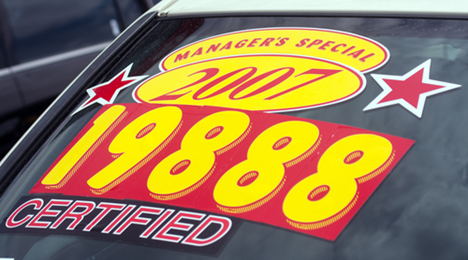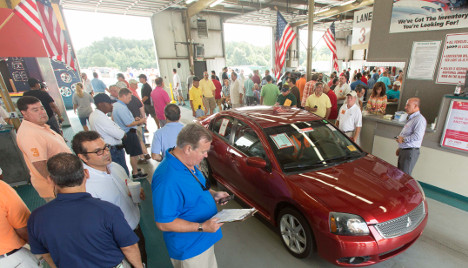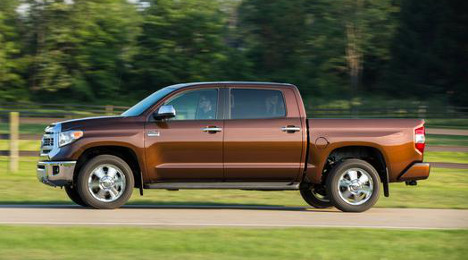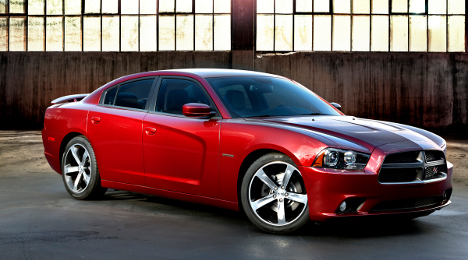The certified pre-owned vehicle market in the first three months of the year reached a combined tally of 646,390 sales, which Edmunds.com says is a first-quarter record. The Q1 sum is also a 5.2-percent year-over-year increase, Edmunds reported in its Q1 Used Vehicle Market Report released Thursday.
But the fact that CPO penetration of franchised dealer used-car sales remained essentially static from a year ago at 21.7 percent surprised the team at Edmunds.
Typically, current-year CPO parallels leasing from three years prior, explained Edmunds director of industry analysis Jessica Caldwell.
And with off-lease volume being the story of the year in the used-car market, it’s a bit puzzling as to why CPO hasn’t yet taken a greater share of the franchised used market.
In due course, though, certified should pick up a bigger piece of that pie, she said.
“The inventory is there,” Caldwell said in a phone interview Wednesday afternoon. “There’s nowhere really for it to go at this point but up. So, I think that’s why it was a bit surprising.”
Edmunds is anticipating the CPO share of franchised used sales to increase as the year goes on. It may be an odd timing situation, Caldwell said, where more lease returns are hitting the market later, therefore bumping the full-year CPO penetration rate higher than what was seen in Q1.
So, is 25 percent CPO penetration too lofty of a target?
Caldwell doesn’t think so, considering the leasing rates in recent years.
In 2012, lease penetration for new-car retail was about 22 percent, she said, and then it climbed to about 26 percent in 2013. It’s only gone up from there, getting close to 29 percent in 2015, Caldwell said.
“When you look at CPO, there is that room to grow, especially when you’re looking at 29 percent of a much higher total volume new market,” she said.
It might just take some time.
But look for that CPO share to rise.
With the millions of recalls in the pipeline nowadays, compliance expert Randy Henrick contends dealerships find themselves in “a difficult situation,” especially in light of how the Federal Trade Commission settled with General Motors and two large dealership groups about how certified pre-owned vehicles are marketed.
Back in January, the FTC indicated GM as well as Jim Koons Management and Lithia Motors touted how rigorously they inspect their vehicles, yet failed to disclose that some of the used models they were selling were subject to unrepaired safety recalls.
Under proposed consent orders, which would remain in effect for 20 years, the FTC said the companies are prohibited from claiming that their used vehicles are safe or have been subject to a rigorous inspection unless they are free of unrepaired safety recalls, or unless the companies clearly disclose the existence of the recalls in close proximity to the inspection claims.
And with the ongoing Takata airbag inflator issue involving possibly 60 million units, recalls could include a wide array of CPO models. Henrick explained the precarious position dealers might face as a result.
“Having to advertise for every certified vehicle that this vehicle may be subject to a recall — unless the dealer services the brand and cures the recall or gives the customer a copy of the recall certificate — dilutes the certification value as recall information can be accessed on the (National Highway Traffic Safety Administration) website,” said Henrick, who was Dealertrack’s regulatory and compliance counsel for 12 years and now conducts industry consulting at www.autodealercompliance.net.
“But when you are dealing with hundreds of used vehicles, it is not practical for a dealer to look them all up,” Henrick continued. “If a dealer is selling another brand’s used car, the dealer can’t practically cure the recall.”
The FTC added the proposed orders with GM, Koons and Lithia also would prohibit the companies from misrepresenting material facts about the safety of used vehicles they advertise.
These proposed orders will also require the companies to inform recent customers, by mail, that their vehicles may have an open recall.
“Safety is one of the biggest considerations for consumers shopping for a car,” Jessica Rich, director of the FTC’s Bureau of Consumer Protection said when the regulator announced its settlements at the beginning of the year.
“So companies touting the comprehensiveness of their vehicle inspections need to be straight with consumers about safety-related recalls, which can raise major safety concerns,” Rich continued.
Is the FTC achieving its objectives as a result of this action? Henrick isn’t so sure.
“I think as consumers begin to see these notices on all certified used car sales, they will become insensitive to them and that will hurt the recall business, which is the exact opposite effect the FTC would like to achieve,” he said.
Car-buying college grads may discover that picking a major was easier than choosing from among the hundreds of vehicles out there.
To help make the car-buying process a little easier for them, Autotrader has compiled a list of the nine models it thinks young adults should have on their shopping lists.
Three of those models — Chevrolet Equinox, Lexus CT and Hyundai Sonata — are certified pre-owned units.
“CPO cars merit close consideration, as they offer many of the benefits of a new car, like low mileage and bumper-to-bumper limited warranties, without the new-car price tag,” said Brian Moody, executive editor at Autotrader.
Also making the list were Fiat 500X, Honda Civic, Kia Soul, Mazda3, Scion iA and Subaru Crosstrek.
“All of the vehicles we picked for this list are fun, reliable and thoughtfully designed — perfect choices to fuel the next phase of your journey,” Moody said, adding that all cars on the list carry a price tag under $25,000 and at least 30 highway mpg.
Autotrader also offered three pearls of wisdom for young buyers:
— CPO vehicles offer the best of both worlds. Consider certified pre-owned cars first, as they are lower-cost alternative that gets you into a nearly new car. CPO vehicles are late-model, low-mileage vehicles that have been fully inspected according to manufacturer guidelines and come with a warranty. You can likely get a CPO vehicle in a higher trim level (or class) for the same price as a lower-end new car.
— Credit has a bigger impact than you might think. Your credit score has a big impact on the deal you can get, as well as the programs and promotions for which you qualify. It not only determines how good your interest rate will be, it also affects your monthly payments over the life of the loan. Most advertised deals are for people with excellent credit, which many young car buyers haven’t yet built.
— There are two kinds of test drives. The test drive you do when you're shopping should be different from the one you do when you're ready to buy — and these should happen on different days. When you’re shopping, get behind the wheels of two or three of the models you’re considering to find out which ones are as good in the real world as they are on paper. Once you’ve made your choice, take a long, thorough test drive on a different day in the exact vehicle you plan to buy.
For a more detailed look at Autotrader's picks, click here.
Certified pre-owned vehicle sales keep setting new records, seemingly on a monthly basis. But NADA Used Car Guide executive analyst Jonathan Banks proposed that automakers and dealers are going to need more than just CPO programs in order to handle the steadily growing volume of off-lease units.
Part of what is triggering Banks’ concern is what he’s seen OEMs do so far this year. According to NADA UCG’s analysis of data from J.D. Power’s PIN Network, which covers about 35 percent of the total auto finance market, there has been a 5-percent rise for lease subventions.
“Manufacturers have been very reliant on lease subvention to keep (new-vehicle) sales humming,” Banks said. “I don’t believe this is sustainable.”
If the practice to turn new metal does not continue long-term as Banks suspects, there are still going to be additional off-lease vehicles for automakers and dealers to handle. It’s been widely reported by Auto Remarketing that industry experts see that off-lease volume growth this year could reach 800,000 units and maybe more.
“On the used-car side, manufacturers should really work closely with their dealers to create a comprehensive used-vehicle strategy that’s a lot more than just creating a certified program,” Banks said. “Certified is great and it’s great for a lot of customers. But there are a lot of customers who will be coming back that won’t want to pay the money for certified.
“They’re going to have all of this used inventory coming back,” he continued. “To me with the amount of data that’s available out there, I think manufacturers can work closely with the dealers on the lease maturities coming back. Get the vehicles to the right dealers. Price the off-lease supply correctly for the dealer so they can still make a profit. It’s all about working together to ensure that the off-lease inventory is getting to the right regions and are sold at the right price to get the right turn to keep that used-vehicle channel humming.”
Banks also cautioned that franchised dealers have to avoid a rivalry that might erupt within the store — a clash between the new department versus the used division.
“You’ve got to remove that idea that used vehicles are cannibalizing new,” Banks said. “You should look at new and used working together to enhance that customer experience for the individual franchise. CPO plays a role; some creative financing plays a role, too, in making sure that used buyer is getting the same brand experience as a new buyer.”
Sloan and Tyler are sitting with the salesperson at the dealership contemplating whether to buy that 2012 Scion.
While Tyler is ready to agree to the terms, Sloan is worried about what’ll happen if the vehicle breaks down suddenly and she is stuck on the side of the highway. They both work and are making ends meet, but barely.
This is a big purchase and a big decision. With so many “what ifs,” Sloan needs reassurances of the vehicle’s safety and reliability as well as assurances that they can afford to maintain their current lifestyle in the case of unexpected mechanical breakdown.
The salesperson tells the couple about the certification on the vehicle and the details of the warranty that is included, and that it has been through a rigorous inspection and has passed on all points. Sloan agrees and the couple happily drive off in their new purchase. Sloan and Tyler are typical of today’s auto buyer.
By now, most dealerships know the “whats” about certified pre-owned (CPO) programs. Today, we’ll talk about the psychology behind why consumers consider and buy CPO vehicles.
Understanding the psychology behind consumer decision-making allows you to have the ability to predict and solve problems early and reliably. It allows you to create a strategy for your business that sets you apart from your competitors.
Before we get into the psychology of the CPO buyer, let’s take a quick look at the basics behind CPO and the attached warranty.
If a company is selling an extended warranty on a vehicle for $500, then that means the company is betting that over an extended period of time and considering the law of big numbers (thousands of consumers), that it will pay out less than $500 per repair expense. There may be some repair bills that cost more than $500, or even several thousand dollars, but on average, the repair bills will be less than $500 per car.
Next we look at the consumer’s point of view. If they are buying a $20,000 automobile, it might give them reliable service throughout the lifetime that they own it, or it might be a lemon. In their mind, there’s no way of knowing which way it will go, but the consumer hopes it will be a good vehicle. But they’d like to protect themselves against getting a lemon.
This is where the psychology comes in. People are different in how they perceive risks. Some people are “risk averse” — that is, they don’t like to take risks. They would rather pay a little more to know that they are covered against a big loss. To risk-averse people, paying $500 to know that they won’t have to pay $1,000-$2,000 for a major repair just makes sense to them.
However, other people are risk-takers. They are willing to take risks. To them, they’d rather save the $500 and take a chance that the car will be just fine. If there is a big repair bill down the road, they’ll deal with that when the time comes.
Either way, consumers want to be sure they can maintain their current standard of living. Common questions they ask themselves are, “How will I handle a large repair bill if something happens?” or “Without this coverage, will I leave myself and family in debt?”
In “Components of Perceived Risk in Product Purchase: A Cross-Validation,” an article by Leon Kaplan, George Szybillo and Jacob Jacoby, the authors found that risk associated with consumer purchases include dimensions of performance (desire for a warranty), financial (the security to budget how much they can afford), psychological, social, convenience loss and physical risk.
A certified vehicle addresses many of these areas: performance risk (will it work properly?), financial risk (can I afford to pay for repairs?), social (can I get more car than I thought if I don’t have to plan to pay for major repairs? Or can I be put into more car with favorable loan rates, better debt-to-income ratios or higher advance?), and convenience loss (how much time, convenience and effort will be required if the vehicle or parts fail?).
We know now that consumers are concerned about the possibility and consequence of breakdown. They’re concerned about the safety and security of their purchase and they need to have trust with the dealership.
How can we best leverage consumer psychology?
Looking at a recent Autotrader consumer survey, 82 percent of consumers have positive feelings about certified vehicles. Almost two in three want the peace of mind that comes with a certified vehicle, which means that the vast majority of consumers today are risk-averse. And, of shoppers surveyed, two out of three are willing to pay a premium for these vehicles!
Consumers are concerned about the safety and reliability of their vehicles, and even more concerned about being able to maintain their standard of living in case of a large or catastrophic repair bill. The Autotrader study shows that they are willing to pay more than $2,000 extra for the benefits CPO vehicles provide.
With a certified vehicle, consumers are protected from the negative financial impact of a costly mechanical breakdown. Consumers can utilize the warranty attached to the certification to cover the cost of the mechanical repair with a small deductible, assuring that they aren’t hit with a repair bill that could financially set them back several months or more and adversely change their lifestyle.
The final piece of the equation is that consumers who are attracted to CPO vehicles purchase vehicle service contracts (VSC) more often than those who are less risk averse. In fact, an industry study shows that CPO buyers purchase VSCs 15 percent more often than non-CPO buyers.
In today’s price-compressed marketplace, front-end profits are dropping. Sales of vehicle service contracts offer high profit margins and present a win-win scenario with a consumer who is risk-averse or one who has experienced prior loss. Understanding the psychology of the CPO buyer will help build more profitable relationships for your dealership.
How many Sloans and Tylers do you have coming into your dealership or looking at your virtual inventory? Are they seeing what they need: the trust, safety and security provided by today’s CPO programs? Fill these needs and they will be happily driving off of your lot with their purchase!
To learn more about CPO and to see the top-rated CPO programs, according to Autotrader, visit www.autotrader.com/cpo.
Rob Christman is the fixed operations director of sales at Cox Automotive.
Manheim on Tuesday announced it is teaming up with Alliance Inspection Management to enhance its vehicle inspection capabilities at auction sites and dealerships throughout the U.S.
More than ever, dealers are relying on inspection reports to aid the sales process and make buying decisions. Last year, Manheim conducted 3.5 million vehicle inspections, and the company expects that figure to top 4.2 million this year.
“Our condition reports help clients gain a better understanding of their vehicles’ market value, which, in turn, enables them to manage their inventory as profitably as possible,” Shane O’Dell, senior vice president for Manheim Vehicle solutions, said in a news release.
Used vehicles with condition reports are about four times more likely to sell than cars without them. Online and in-lane buyers tend to look first at listings with condition reports to identify vehicles they want to target. Additionally, inspection results cut down on arbitration; Manheim’s and AiM’s arbitration rate for cars with condition reports is less than 1 percent.
The volume of vehicle condition reports has increased greatly since 2014, averaging 20 percent year-over-year growth. More than 70 percent of large dealers and 46 percent of small to midsize dealers are using real-time data about a vehicle’s current condition to make better decisions and make it easier to conduct business. Another driver of condition report volume is the growing need for mobile inspections, as buyers and sellers evolve their strategies to add more digital environments to their sourcing and sales networks.
Manheim and AiM first formed an alliance last March to examine best practices and standardize new inspection technologies across live and online auctions to create greater consistency in the inspection process.
Edmunds.com is partnering with several top car brands to promote the benefits of certified pre-owned vehicles as part of CPO Month in May. The effort, which includes backing from title sponsors Toyota and Lexus along with Mercedes-Benz and Volvo, is happening during a time when shoppers are becoming increasingly aware of the benefits of CPOs.
“Many automakers have a ‘truck month’ or other sales events for specific segments, but CPO has been largely ignored – until now,” George Kang, senior vice president of OEM Business for Edmunds, said in a news release. “Shoppers owe it to themselves to learn more about the benefits of certified pre-owned cars.”
CPOs are generally defined as used vehicles that have undergone a minimum 100-point inspection in which any mechanical and body issues are addressed. Such vehicles generally come with a manufacturer-backed warranty and may include other benefits such as free maintenance, 24/7 roadside assistance and low-APR financing — many of which are offered in Lexus' and Toyota's CPO programs.
L/Certified by Lexus offers an unlimited-mileage warranty up to six years, a two-year/20,000 mile complimentary maintenance plan, a 161-point inspection, and 24/7 roadside assistance. Toyota CPOs come with a 12-month/12,000-mile limited comprehensive warranty, a seven year/100,000-mile limited powertrain warranty, one year of roadside assistance, a 160-point inspection and CARFAX report; additionally, certified customers are eligible for standard new-car financing rates.
According to a survey conducted late last year by Edmunds, 88 percent of used-car shoppers said that they would be willing to pay more for a CPO vehicle than a comparable, non-CPO vehicle.
The certified pre-owned vehicle market climbed more than 8 percent in April and approached 233,000 sales for the month, according to Autodata Corp.
Releasing figures late Wednesday afternoon, Autodata said there were 232,853 CPO sales last month, which beat year-ago figures by 8.3 percent and pushed the year-to-date tally to 879,211 sales (up 5.9 percent).
Lexus had its best month ever with 8,894 CPO sales (up 27.8 percent) and has now sold 31,888 certified vehicles this year (up 19.6 percent), according to Autodata.
Asian-brand CPO sales reached 112,696 for the month (up 13.8 percent) and have hit 417,866 year-to-date (up 11.5 percent).
European sales were up 0.9 percent for the month at 37,405 units sold, but were down 1.2 percent year-to-date at 140,740 CPO sales.
The Big 3 recorded 82,752 certified sales in April (up 4.9 percent) and 320,596 sales year-to-date (up 2.5 percent).
Though it’s a bit early to tell how increasing off-lease volume impacted certified pre-owned sales in April, the gains have certainly pushed CPO sales in recent years and so far in 2016.
But keep this in mind, Kelley Blue Book’s Alec Gutierrez said during a teleconference with reporters on Tuesday: Extra off-lease supply can be a “doubled-edged sword” for the certified market.
Granted, additional off-lease supply helps dealers make sure they have enough CPO inventory for consumers, he said — particularly given the “growing desire” for certified as these shoppers become more aware of its benefits.
“But it’s a bit of a double-edged sword in the long-term, in that if you have increased leasing driving additional volume at auction … sure, you have a lot of additional CPO volume, but at the same time, if you have that negative impact to resale values, that limits the possible margin on those certified pre-owned sales,” said Gutierrez, senior analyst with KBB.
“It limits your ability to lease, as residuals potentially take a bit of a hit,” he said. “It’s good to have the inventory, but long term, it does put additional pressure on your new-car business.”
CPO sales in April
Industry-wide numbers had yet to arrive as of Tuesday afternoon, but below are some April sales results reported by indiividual automakers.
Hyundai had its best April ever with 9,059 CPO sales, which was a 10-percent increase from April 2015.
BMW (11,276 CPO sales, up 7.8 percent) and MINI (1,094 sales, up 14.6 percent) also had their best Aprils ever, respectively.
Porsche sold 1,499 certified vehicles in April. This represented the automaker's second-strongest CPO month ever and a 24-percent year-over-year gain.
Likewise, Kia had its second-best month of all time with 6,583 CPO sales (the best was March).
Mercedes-Benz posted 10,054 certified sales for a 7.3-percent hike, with year-to-date sales reaching 39,357 units (up 4.1 percent).
Volvo reported 1,386 certified sales in April, down 17.6 percent from the same month in 2015. Year-to-date, Volvo has sold 5,083 CPO vehicles, which is off 14.7 percent from last year’s pace.
Mazda sold 3,392 certified vehicles for the month, compared to 3,403 last April.
Year-to-date sales are at 12,527, down from 13,678 a year ago.
Audi sold 4,055 CPO vehicles for the month.
Volkswagen had 6,041 certified sales for the month, down 19.2 percent from last April. Year-to-date sales are down 17 percent at 25,565 units sold.
Fiat Chrysler Automobiles and shopping website CarGurus announced an agreement on Wednesday that provides the automaker’s franchised dealers an opportunity to advertise and post their certified pre-owned vehicle inventory on the CarGurus site.
Executives highlighted the agreement puts dealer CPO vehicle inventory in front of 20 million monthly unique automotive shoppers on the CarGurus website and gives FCA dealers access to the platform's top-performing lead generation and display advertising programs.
“As our dealers drive continued growth with CPO, it’s important that we support their efforts to get these vehicles in front of as many shoppers as we can," said Eric Swanson, head of certified pre-owned vehicles at FCA US.
“In partnering with CarGurus, we are opening a new channel to expose these great vehicles to highly engaged buyers,” Swanson continued. “We’re confident that CarGurus will help us generate quality leads for our stores and tell the CPO story in ways we never could before.”
Founded in 2007, CarGurus uses technology and data analysis to help consumers search their local market for the best vehicle deals, and then connects shoppers with listing dealerships. CarGurus works with dealers and OEMs to incorporate their inventory feeds on the site, and offers dealerships a range of high-performance lead generation and audience extension advertising packages.
“We are excited to bring more FCA US certified pre-owned vehicle choices and brand information to CarGurus shoppers, and we look forward to working with FCA US dealerships to help them reach our audience with the most efficiency and impact,” said Frank Weishaupt, senior vice president of audience sales at CarGurus.
“There's no question that CPO is becoming an important consideration for car buyers, and aligning with brands like FCA to tell their CPO story allows us to help our users make the best buying choices,” Weishaupt continued.
Dealers interested in learning more about CarGurus free and paid subscription programs should contact the FCA US Certified Pre-Owned Vehicle group.












